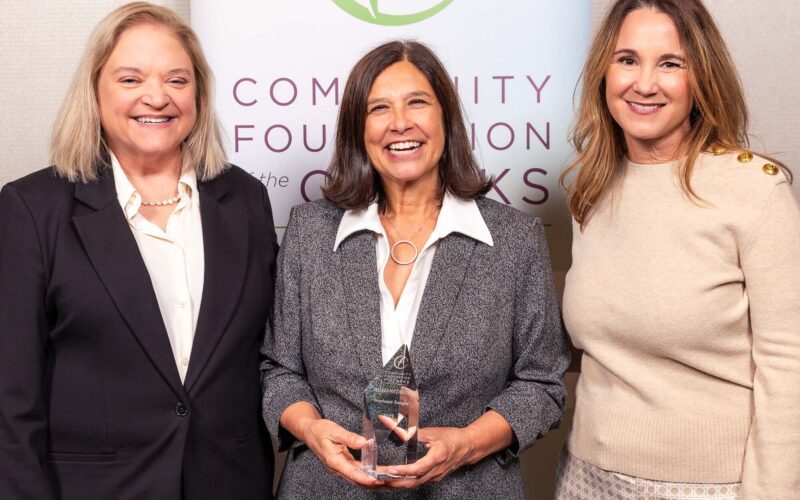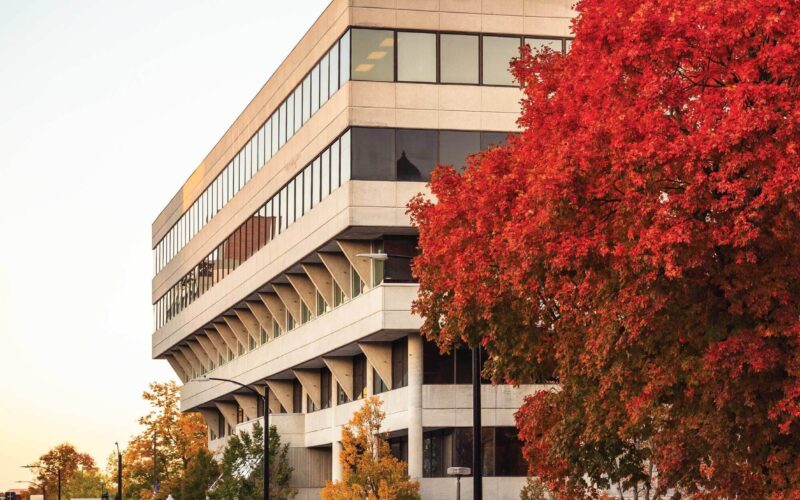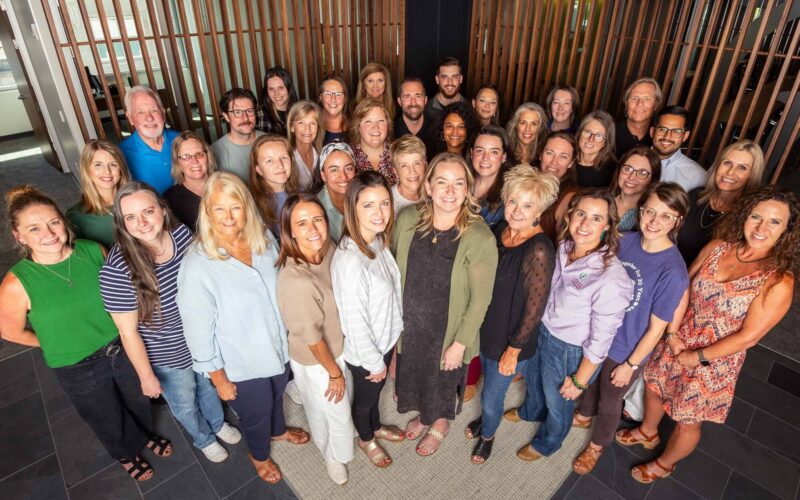In their own words, Springfield-Greene County leaders reflect on the last two years — and look ahead to the future
Rob Blevins · Executive Director, Discovery Center of Springfield
Bart Brown · President and CEO, Ozarks Food Harvest
Janet Dankert · President and CEO, Community Partnership of the Ozarks
Bob Dixon · Presiding Commissioner, Greene County
Steve Edwards · President and CEO, CoxHealth
Brian Fogle · President and CEO, Community Foundation of the Ozarks
Dr. Hal Higdon · Chancellor, Ozarks Technical Community College
Dr. Grenita Lathan · Superintendent, Springfield Public Schools
Ken McClure · Mayor, City of Springfield
Craig McCoy · President, Mercy Springfield
Matt Morrow · President, Springfield Area Chamber of Commerce
Rev. Bob Roberts · Co-Chair, Have Faith Initiative
Cora Scott · Director of Public Information and Civic Engagement, City of Springfield
Clif Smart · President, Missouri State University
Katie Towns · Director of Health, Springfield-Greene County Health Department
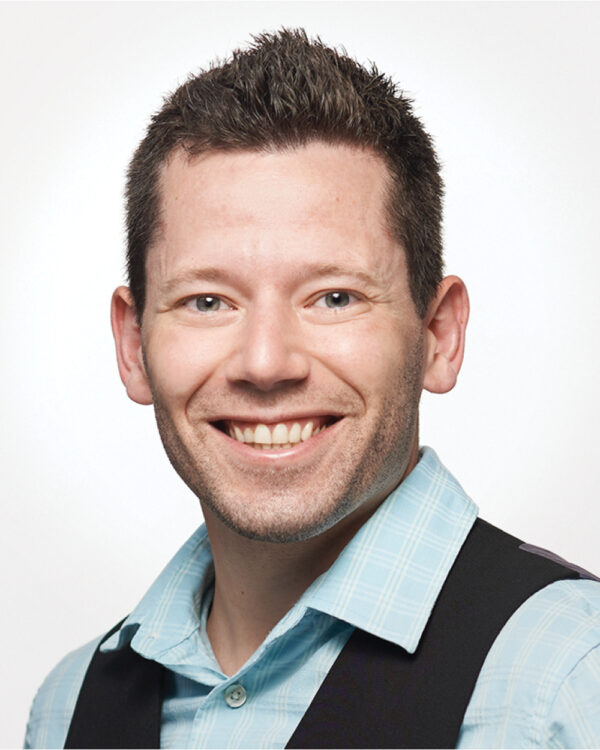
Rob Blevins
Executive Director, Discovery Center of Springfield
Science has always been at the heart of the Discovery Center of Springfield’s mission — and now, so is compassion. In early 2020, Executive Director Rob Blevins led the center’s transition, within 48 hours, to a multistory science center to serve the children of health care workers. The shift fulfilled two needs: Keeping health care professionals serving their community while keeping their kids in a safe and learning-centered environment. That effort and others led to national recognition in December 2021, when the center was named the inaugural STOP Award winner from the Center for Education Reform and Forbes. The selection, based on Discovery Center’s efforts during the pandemic, came with a $1 million prize. Soon, the center will continue to evolve and expand by offering a preschool to help address kindergarten readiness.
On learning to say when you need help
“One thing we could learn from this is to tell people when you need help. I think that’s a lesson that we can learn. When I had more time to help students, I was able to help more students — but then a lot of times I found out on a press release that people needed help, and that’s the wrong time. I think there could be a community collaborative that could say, ‘Hey, we’re about to have 24,000 kids who need childcare.’ Or maybe there’s a website they can go to, and here’s the resources. We could talk about the numbers we’re each able to take in, and work together.”
On understanding and using the resources you have
“I think, looking around and thinking, ‘What do I have and how can I help with the resources I have,’ is really all anybody can expect from anybody. But if you look around you and see that you have resources, and then don’t help others — that’s bad. As a community, you don’t stand a shot if the people with the resources aren’t willing to use them for the greater good. I really think that’s important, too.”
On expanding to offer preschool
“It was it was an effort that had to be less of a priority because it wasn’t what the community needed the most out of the different programs we’re able to offer. But it’s finally now accepting students and enrolling. That’s a big shift because I know the long-term impact is that there are much fewer options for daycare.”
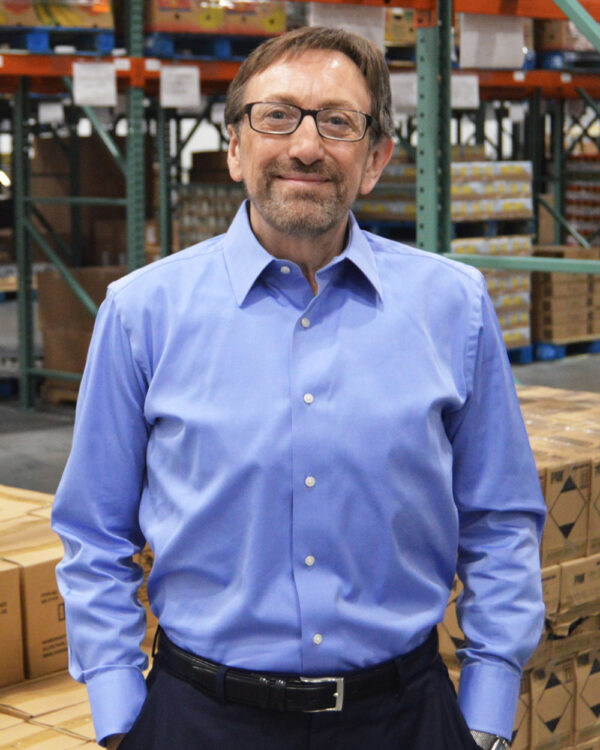
Bart Brown
President & CEO, Ozarks Food Harvest
The need for food is about more than just what one eats. It involves logistics, supplies, external factors — such as rising costs of living — and a chain to distribute sustenance to those who need it. Bart Brown, president and CEO of Ozarks Food Harvest, saw these issues come to light in new ways when the start of the COVID-19 pandemic, and the widespread layoffs and job changes that followed, instigated a dramatic increase in need. As Brown plans a path forward, he also sees the silver lining of some shifts from the pandemic, such as the success of a mobile food pantry.
On looking forward
“There’s a lot more direct intervention needed. There’s a lot more work on the ground that we can do, especially in the rural counties of our service areas that are particularly underserved — sometimes there’s only one agency or one food pantry in a county. Because we were able to do the logistics of direct distribution very efficiently, that’s something that we feel like we can scale really well and then use that as a way to help communities grow their own locally supported or locally helped programs.
“The other thing is that we saw that many of our agencies that we serve need commercial coolers, freezers, things like that — equipment that either they need more of, or they need older equipment replaced. There are some physical infrastructure needs that are barriers that we have a plan over the next three years to tackle as well. So there’s a number of different long-term barriers that we were able to identify, but being in emergency mode gave everybody the adrenaline to work through them.
On implementing a mobile food bank
“We knew that our existing agencies, such as Crosslines, Least of These and 290 others, would not be able to handle the influx of need. Twenty thousand people got laid off in a month in August of 2020. There’s no way they can handle that, so we took that on for them. We served 60,000 people through our mobile food pantry, continuously, and are still doing that on a smaller scale, so that our partner agencies did not have to respond to that need on top of their own. And what we found was that’s a very efficient way of meeting needs in underserved areas, including Springfield, and we’re going to continue with that.”
On understanding the ongoing need
“For our clients, now, a lot of them are back to work. But now there are still supply chain issues. Protein items are extremely expensive. There’s a lot of pressure there. And then you had the unprecedented rise in the cost of housing in our market in particular. It’s a perfect storm — for our clients, that’s what they are facing: increased fuel costs, increased energy costs, increased housing costs, increased food costs — and perhaps a mildly increased starting wage.”
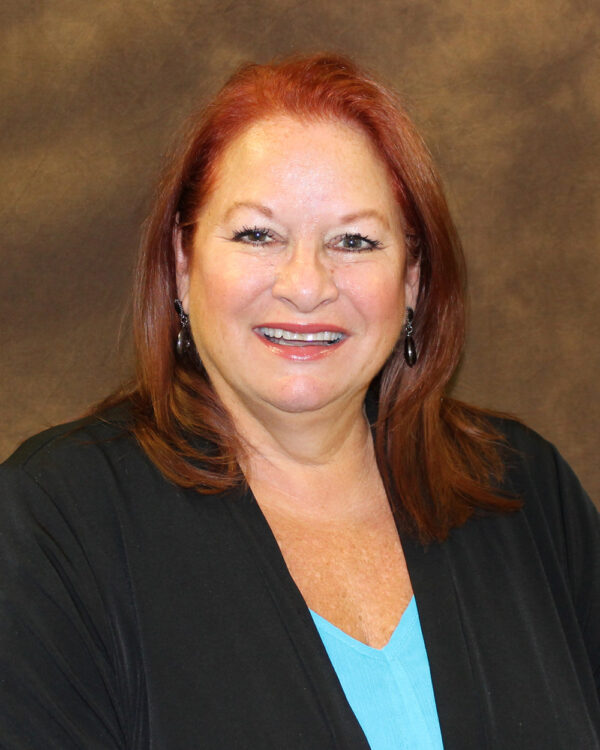
Janet Dankert
President and CEO, Community Partnership of the Ozarks
The virtual shift prompted by the COVID-19 pandemic offered both opportunities and challenges for Janet Dankert, president and CEO of Community Partnership of the Ozarks. The organization serves a wide spectrum of clients, including many who are without homes and access to technology, leading to unique approaches to serve different communities.
On the impact of virtual work
“Connections are so important, especially in the work that we do, but the pandemic’s effect on us as an organization was a lot more than we even realized. Going from a highly connected organization that is very team-focused to forced isolation with less personal contact and all Zoom meetings impacted our engagement with each other. It was unavoidable but still disruptive. We are excited to refocus on new ways to build connections within our team.”
On how the pandemic has reshaped priorities
“I have a stronger sense of purpose and recognize the importance of the small things as well as the people in my life. I’ve also made changes in the ways I spend my time and who I spend it with.”
On planning ahead for future emergent situations
“Have a collaborative system in place for coordination. Be flexible. Work ahead for safety and disaster situations so you have a plan you can implement quickly. Always put the safety of your team and those you serve first. Practice self-care and model that for your team.”
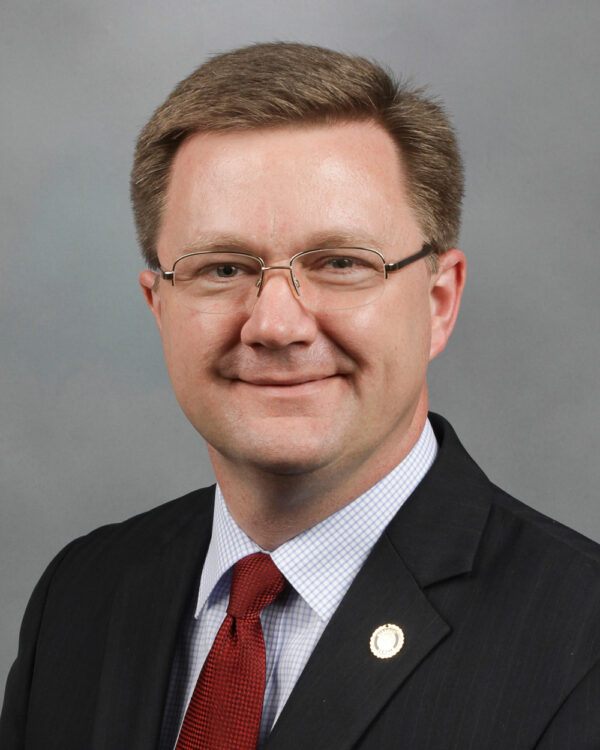
Bob Dixon
Presiding Commissioner, Greene County
As Greene County Presiding Commissioner, one of Bob Dixon’s top roles through the COVID-19 pandemic has involved the distribution of government support funds. This effort included the Coronavirus Aid, Relief, and Economic Security Act, which gave $34 million to Greene County with a required distribution period of six months. Another element still underway is $57 million in funding from the American Rescue Plan Act, which is overseen by a committee of nine citizens and will gradually disperse resources over the next three years. These efforts are supported by Dr. Lyle Foster, who has led the distribution of both CARES and ARPA funds.
On making a plan to distribute government aid
“It’s very difficult to get a grant organization up and running and completed within six months if you haven’t done it before, but we were able to do it.
“We learned a lot from that CARES process. We learned some things that we would do differently, just as far as flow and the process, and we’re implementing those changes into the process that we’re using for the ARPA money.”
On learning from public sentiments
“We knew that the vaccine was the solution. We had masking, but when the vaccine came out, that was really the answer: to get folks vaccinated. But how could we do that when all of the polling indicated a large segment of society had resistance to the vaccine if government actually told them to go get the vaccine? The polling indicated it was more effective, and you actually got a higher take level, if rather than telling folks to go get the vaccine, if government just encouraged people to go talk to their medical provider, and let them make that decision.
“There are some things you can’t listen to polling on. You have to do what you know is right. But when it’s trying to get the public to do something, you have to listen to the public and know how they want to be directed. And so that was one of the big takeaways for us that really was instructive. So if we were talking to folks in the future who were dealing with something, I would say: Listen to the science, but you also have to listen to the people and understand who your audience is, and how you’re going to get them to do something.”
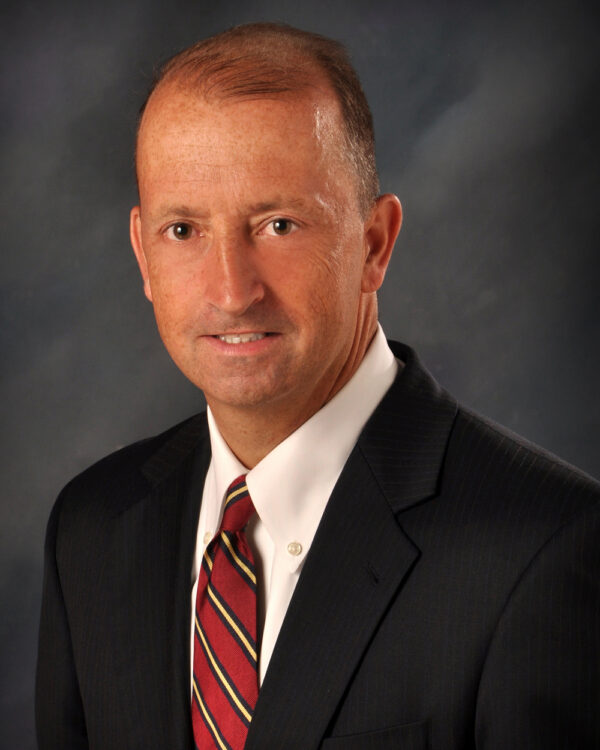
Steve Edwards
President and CEO, CoxHealth
Even before the first COVID-19 case was diagnosed in Greene County, CoxHealth President and CEO Steve Edwards saw a need. Starting in early 2020, he, along with the health system’s Incident Command team, worked to navigate the ever-evolving pandemic by adding patient care space, stockpiling personal protective equipment, avoiding layoffs and more. He also worked to keep the region and beyond informed of the realities of COVID-19 through the power of social media.
On immediately recognizing the need
“I think the attitude that we had as an organization was that there’s this slow-moving natural disaster coming. We’re maybe more aware of it than the general public, and how urgent should we make our response?
“One of the most powerful moments is when we added a 51-bed COVID ICU and the whole story behind that. Of JE Dunn, not taking profit and not taking overhead for it, and the subcontractors doing the same. Then ultimately Prime supporting it, and it initially sitting idle. And now, we’ve probably had 3,000 patients go through there.”
On being united with a common mission
“I’ll always remember people just flooding to the hospital to provide what they could. I think that was an absolute highlight. Another was the collaboration among our physicians with each other. Never before would we have a meeting that 180 or 200 physicians would be part of, and that was happening once or twice a week. It was a unifying sense of purpose. I know there’s tragedy and crisis in all this, but it was also really rewarding to see how people came together. It’s a ‘Band of Brothers’ story for me from the inside. People fought together, bonded, and we’ll always remember this time together.”
On facing endemic disease
“I don’t think anyone thought it would have two-plus years. I remember when all the leading experts said COVID would be like a snowstorm. And I remember saying, ‘I think it’ll be a long winter.’ And it’s been more than a long winter. So I think we underestimated that — and, of course, we’re not through it. There may be other waves and other variants. But we do know we do have a lot of antivirals, and a lot of monoclonals, and more ability to advance those, and we know the value of vaccines.
“Someone described COVID sort of like smoking-related injuries; that it’s now avoidable. Just like lung cancer is generally avoidable if you don’t smoke, or heart disease related to smoking is generally avoidable if you don’t smoke. Like with virtually every disease we have, there’s a percentage of all of us that don’t do a great job taking care of ourselves. It makes sense that this is the same way.”
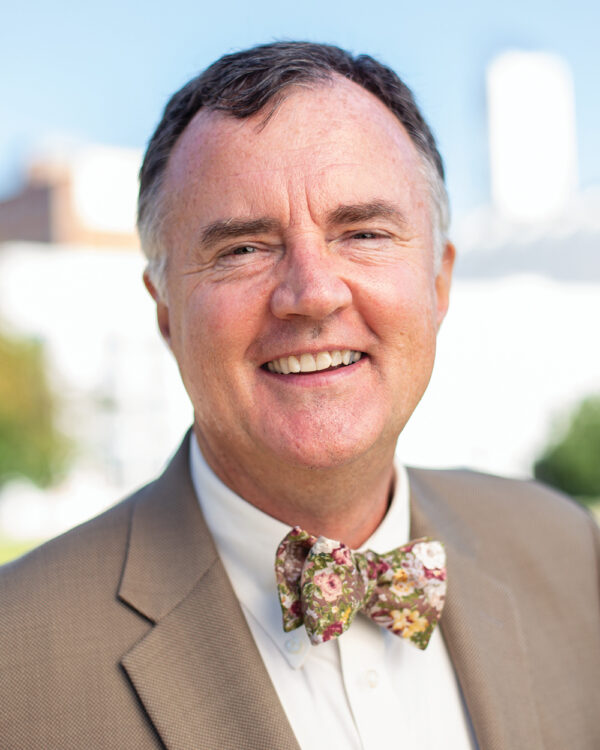
Brian Fogle
President and CEO, Community Foundation of the Ozarks
Understanding and meeting needs has long been the aim of Brian Fogle, president and CEO of the Community Foundation of the Ozarks. Those goals evolved in new ways through the COVID-19 pandemic when, in the face of need, the CFO to quickly adapted its efforts to serve in unexpected and desperately needed ways.
On understanding and responding to evolving community needs
“I think we’ve always been responsive, but we would plan a year ahead. That’s what was different this time — we would plan in a day. I applaud our board, too. We were fortunate to be in a good financial situation and we had built up operating reserves. Our board was willing to say, ‘These are rainy day funds, and there’s a deluge.’ We’ve done that three different times in which we’ve committed our reserves to grant programs, because of the need of this unprecedented pandemic. I also think having those discretionary funds was key, so we had not committed everything, and we were able to respond quickly because we had flexible discretionary funds.”
On experiencing growth and change
“I’ve learned how effective people can be working from home and virtually. The old model of 8 to 5 and coming in and meeting face-to-face — there are alternatives that are very, very effective.
“On a personal basis, I read a poem early on that somebody had written out of Minnesota, about how ‘Never again will I take for granted a full movie theater, live music, laughter at dinner with friends.’ I’ll try not to take that for granted anymore. Because when we didn’t have it — I’m a social person, and I love being with other people — that was hard. I hope I’ll never take those moments for granted again.”
On moving forward
“I think of 9/11, when it brought us together as a country and a nation. This didn’t — we were having arguments over masking and whether this was even a real thing. I think instead of bringing us together, it probably further exacerbated divisions. One of the things we’re working on for next year is how do we, as a community foundation, help a community heal. Heal from a pandemic, from the divisions, from the wounds caused by this divisiveness. We’re having those discussions: What can we do about that?”
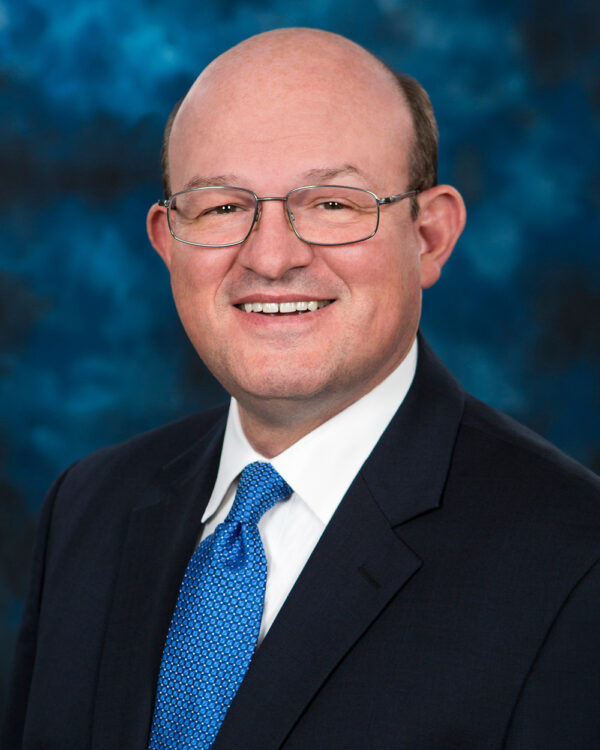
Dr. Hal Higdon
Chancellor, Ozarks Technical Community College
For Dr. Hal Higdon, chancellor of Ozarks Technical Community College, COVID-19 brought both surprise — particularly regarding skepticism of the pandemic’s reality, and ongoing science — and positive shifts in the form of organizational growth. An example is OTC Cares, a decision-making process that has four pillars, which Higdon says helped the organization “own” the decisions its leaders made. He also points to the benefit of having solid frameworks in place, such as ongoing collaboration with local leaders and commitment to technological advancement, that helped foster success during difficult days.
On implementing a hybrid model
“We really changed our modality — not making the mistake that a lot of institutions did nationally of going 100% online — and went to a hybrid model, so that if an instructor was ill or was unsure about a COVID-19 test, they could remotely teach. Or if a student was waiting on a test or was ill, they could go remote. And that has continued, and is really paying dividends because we haven’t had any snow days, even the days we did not have physical classes during the last round of bad weather. So one of the byproducts of COVID is we’ve become much more intelligent about how we conduct classes and much more user-friendly for our faculty and our students.”
On community collaboration
“What I would say to someone 20, 30, 40 years down the road is try to get your leadership all on the same page, which in Springfield, frankly, we did. From our health department, our city, our school district, our colleges and universities, our health officials and our chamber of commerce — we met regularly and we stayed on the same page.”
On the need for grace
“We are a much better organization because of what happened with COVID. That should be true of every obstacle you face. I’m really proud of the way our people adapted. I’m concerned about the lack of civility and grace on a national level, and even state- and local-level issues, from whether the city flag ought to change or whether we should build a Buc-ee’s. But I think, inside our organization, we avoided that. I’m hopeful that as Springfieldians, Greene Countians, southwest Missourians, Missourians, Americans, we can learn to have a little grace and be accepting of people who don’t agree with us without being negative.”
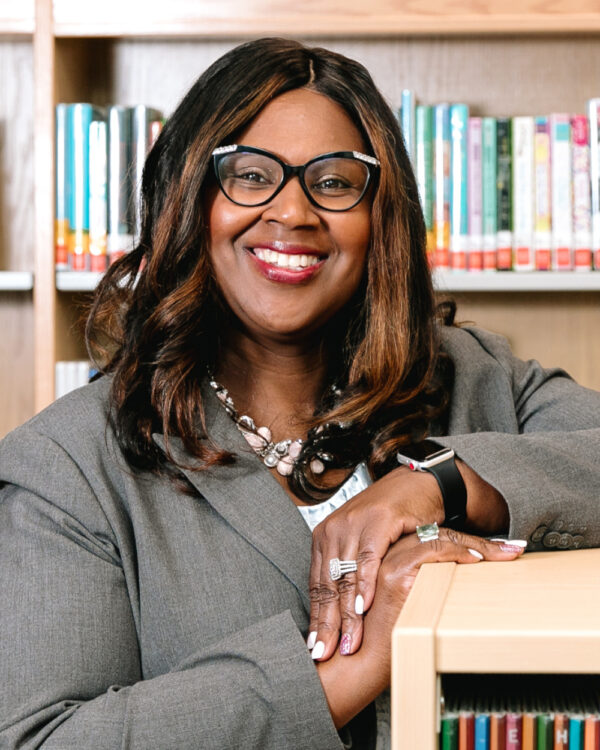
Dr. Grenita Lathan
Superintendent, Springfield Public Schools
Dr. Grenita Lathan joined Springfield Public Schools as its superintendent in July 2021, a time of flux during the COVID-19 pandemic. Cases had tapered off weeks before, but with the arrival of the delta variant, they began to rise again — necessitating action. Just days on the job, and despite community critics, Dr. Lathan reinstated a masking policy for the school district’s summer programs in an effort to help protect the district’s students and staff.
On entering a crisis in-progress
“Initially, I reviewed the district’s reopening plan. I looked at the COVID plan, previous board meetings, communications that the district had shared publicly. I got a feel for what was going on, followed information and stories in the community as it relates to how the greater community was responding to the pandemic, i.e. the City of Springfield, the health department — to have an understanding of where we were as a community, around the pandemic and around masking.”
On trusting your resources
“I share this as many times as possible that I can: I’m very thankful to our health department. The collaboration has been wonderful. They truly helped me with my transition. Before July 1, I came in a week or so early, and they were one of the first groups of people I met with. They held my hand every step of the way. Anytime we called, they were responsive, they got us the data that we needed. They helped us understand from a science perspective, ‘OK, the CDC is saying this now — what do they really mean in layman’s terms?’ They were just wonderful partners.”
On making the decision to resume mandatory masking
“For me, it was not difficult because I believe in the science. I was using the data to make my decision. From that standpoint, as a leader, I needed to do what was in the best interest of the staff and students in our school district. It was not tough. What was disappointing were the comments and people not believing that we were in the middle and are still in the middle of a pandemic. So that was disappointing — but it wasn’t a tough decision to make.”
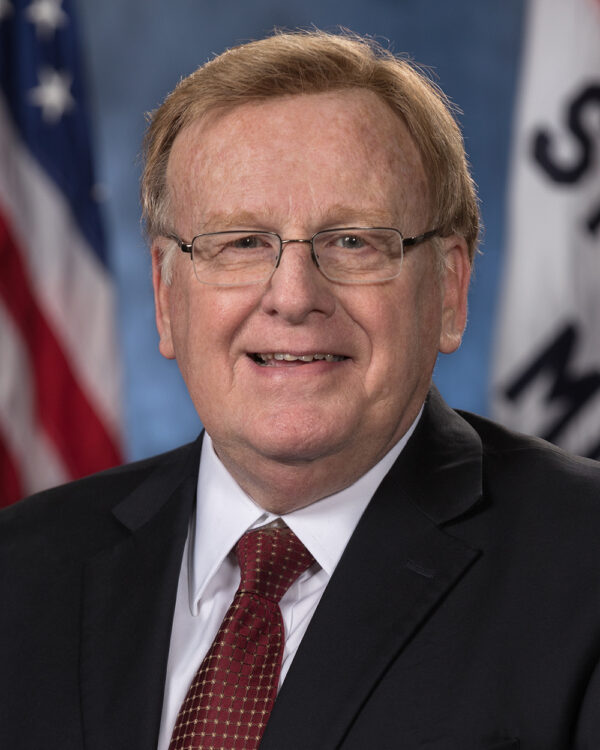
Ken McClure
Mayor, City of Springfield
Mitigating the spread of a virus wasn’t the only unprecedented reality Springfield Mayor Ken McClure navigated through the COVID-19 pandemic. During the turbulent time, McClure and Springfield City Council members made decisions regarding masking requirements and capacity limitations for businesses to help keep the community safe. His focus also involved collaboration with neighboring cities, relying on a structure of transparency between key organizations and entities, and looking to the past to learn from decisions in days gone by.
On the value of getting community leaders on the same page
“Nothing of any consequence happens in this community without a lot of people weighing in on it and having a chance to talk. … That happened because of routes set years ago on community leadership. Entities and individuals talking regularly. The value of that came to fruition when we got into this two years ago because those communications were regular. Every Thursday morning at seven o’clock for weeks, we had a Zoom call with all of those entities in place, and we all heard the same information. So no one was surprised and that was key: Nobody was surprised.”
On learning from the 1918 flu pandemic
“I’ve got copies of newspapers from 1918 in my briefcase that I still carry. The headline in the Springfield paper in October 1918 was ‘Mayor closes schools, theaters, businesses, prohibits all large public gatherings.’ And the order which he issued in 1918 was printed in the paper. You could have substituted the dates and the name of the disease and it’s almost identical to what I had to issue in 2020. I learned a lot from reading about history.”
On seeing Springfield and Greene County as part of a larger picture
“We had to focus initially on where we are and what we can do here locally — the impact that we have locally. That, of course, was challenged because of the health care facilities having their reach all into southwest Missouri and Arkansas. So we were not an island in the sense that you can’t block off Springfield and Greene County. It was challenging. I had regular communication with state leadership; I know Clay Goddard and Katie Towns had far more. My goal was just to make sure that we articulated what our problems were, what our situation was, and then state and other leaders knew it, and make clear what we thought we needed. And then at that point, we had to go take care of the needs as we could best address them.”
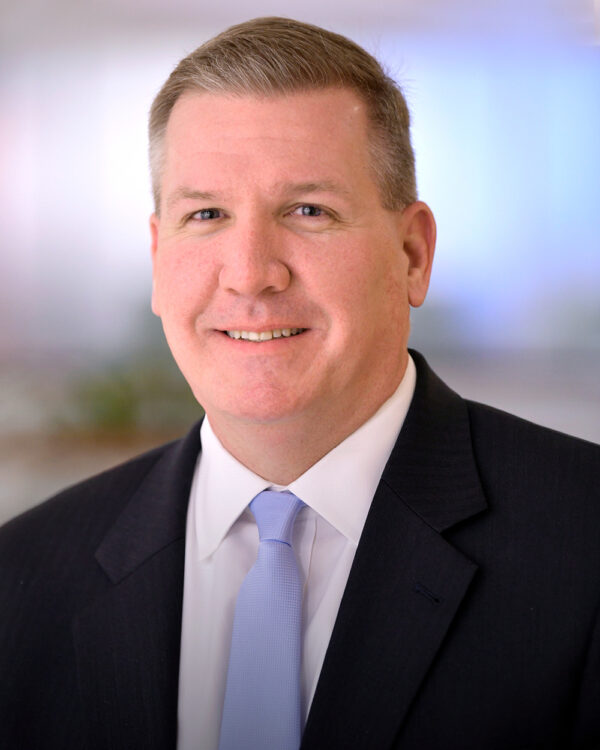
Craig McCoy
President, Mercy Springfield
Craig McCoy joined Mercy Springfield just two months before the pandemic took hold in the Ozarks. His early career as a paramedic served as a good training for the unpredictable and unprecedented times that would follow for the next two years.
On future health care demands
“We’re going to see a continued increase in the next couple of years in people who have steered away from preventive care. I think we’re going to see a surge in disease prevalence due to the lack of preventive care. We’re going to run through that cycle with more demand in regard to those who are being diagnosed now.”
On workforce challenges
“We knew there were workforce challenges coming. COVID just expedited that in rapid fashion. We have to determine how to get the pipelines back up. The challenge is you can generate additional workforce. It’s the experience that went out. A much younger and inexperienced workforce is coming out of this. It’s still people coming and going right now. Until COVID really completely dies down and we move into the endemic status and then we can hopefully get our arms around the travel nurse, agency nurse situation.”
On emergency readiness
“I think we have really good emergency preparedness as a Level 1 trauma center. (Recently), we had four gunshot wounds at the exact same time. This was very different from that. Those situations hit quickly and you move past them in short fashion. This wasn’t like a mass influx. It was a steady, constant flow that you couldn’t get a break from. I think they are two different things. Two very different things. This didn’t subside.”
On community leadership
“Being relatively new when this started, one of the things I was really impressed with were the partnerships and the way people work together. There was a lot more collaboration than competition. I saw that play out here.”
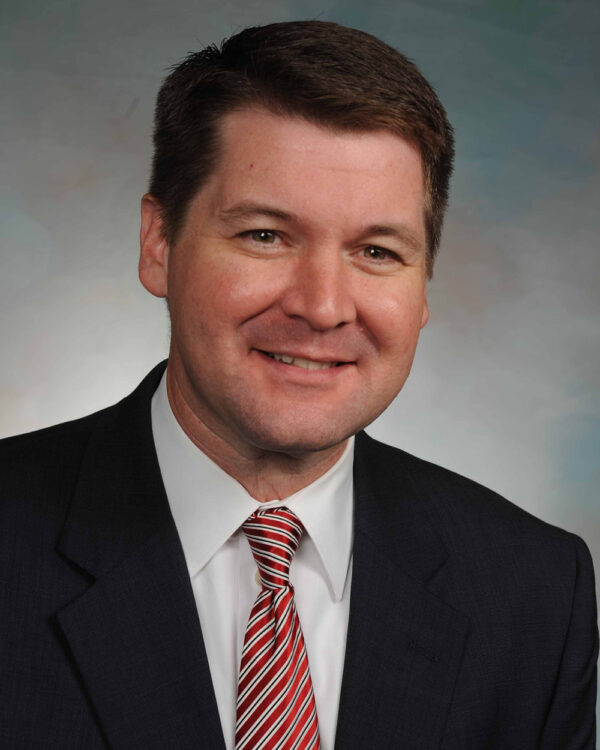
Matt Morrow
President, Springfield Area Chamber of Commerce
As president of the Springfield Area Chamber of Commerce, Matt Morrow has spent his career advocating for business growth and economic development. Those efforts took a new tone through the COVID-19 pandemic, which forced businesses to work outside the box in ways they never expected as shutdowns, occupancy limitations and consumer habits required innovative strategies to navigate and thrive through evolving situations. The pandemic has also offered a reminder to be kind: While always known and important, the pandemic has reiterated that ongoing compassion for all areas of people’s lives is crucial.
On the state of the workforce
“Businesses have done what businesses do: They’ve been very innovative — it’s their nature to do that. When you give a business owner and entrepreneur a complex, hairy unprecedented problem, they’re exactly the ones who will start tackling that in new and creative ways. So we’ve seen that happen in a whole variety of capacities all through the last couple of years, and it continues. The biggest challenge that they’re facing right now, of course, is that the workforce has not come back at the same level that it was before the pandemic — and it was tight before the pandemic. So that’s the big, challenging problem that they’re working to address right now.”
On outside influence on local issues
“The thing that’s been a little bit more surprising to me has been how much people who don’t even live here, or have connection to the community, sort of come in to try to ‘gin it up.’ I didn’t see that coming. I’m generally proud of how our community just responded and handled things in a way that’s very adult. At the same time, it was a little surprising to have someone from Alabama who now is on some sort of national tour, threatening people in health care jobs. I didn’t see that coming.”
On how we see others
“I do think that watching and working with people, as they go through the myriad complexities that accompanied the last couple of years, has led me to a place where I’ve tried to be a lot more mindful about what might be going on in someone’s life that has nothing to do with work. We don’t get to just forget that we’re a whole person. We come to work, we go to school, we do whatever we do, but we don’t get to forget about all the things that we’re dealing with in the rest of our lives. And I think that’s something that I hear a lot of employers being a lot more mindful of. Whatever we’re going through does affect every part of our lives and we need to have a lot of grace with each other about that.”
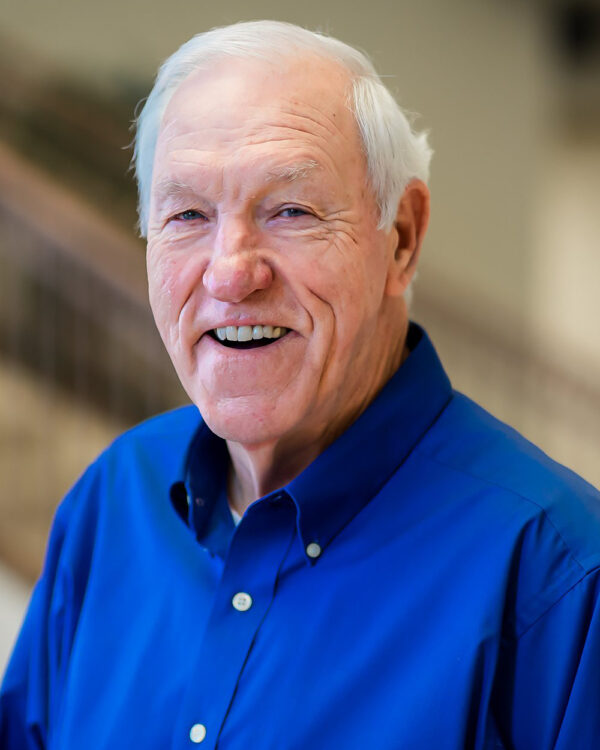
Rev. Bob Roberts
Co-chair, Have Faith Initiative
Shortly after the start of the COVID-19 pandemic, the Have Faith Initiative was created to coordinate response and recovery efforts with local faith representatives. Those individuals, representing a variety of religious traditions, had the opportunity to hear directly from local leaders about where things stood with the pandemic, ask questions, engage in dialogue and offer support as the situation unfolded.
On the impact of including faith in pandemic response
“I want to applaud our community leaders and the CPO, CFO, United Way for having the vision of pulling the faith community in with that process. I think that was very, very critical. If the faith community hadn’t been pulled in then, there would have always been that ‘You’re telling us what to do,’ versus, ‘Thank you for putting your arm around us and bringing us in as part of that process.’ Everybody was at the table and were able to ask the rough, tough questions. The community probably doesn’t even know about that.
“So what lesson did I learn? Come to me early and you have a friend. Come to me late and you have a judge.”
On how church attendance has changed
“It opened up a different way to view church. Because now you got used to viewing it with a bagel and coffee in a comfortable chair over Zoom or YouTube — versus getting up, getting dressed, going to the facility.”
On how the pandemic has impacted faith
“I personally think people that I’ve chatted with were more reflective on their faith because their entire lives were interrupted. We have done more counseling, as well as telephone discussions and on-site counseling, during this time than we had any time previously.
“I think people totally had reflection on where they were currently in their life, what their faith walk was and how do we grow as a community. As a community leader, I always look at it from the bottom-line reflection: Our community is better today because we went through this together versus separately. I know that for a fact.”
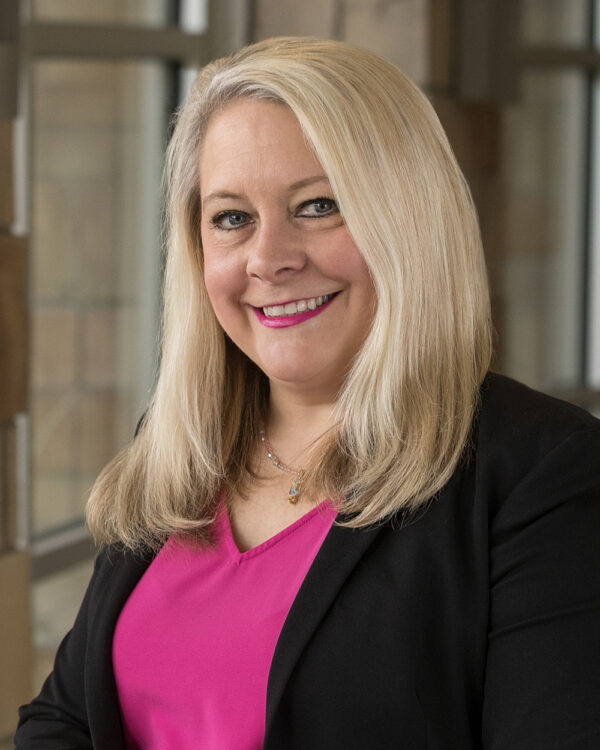
Cora Scott
Director of Public Information & Civic Engagement, City of Springfield
Years spent connecting people with information laid the groundwork for Cora Scott’s role as lead communicator for the City of Springfield and Greene County during the COVID-19 pandemic. Scott worked with health department and local leaders to update the public on need-to-know topics through a variety of channels, including live news briefings that were held multiple times a week at some points in the pandemic.
On addressing misinformation
“I feel like we’ve experienced something that I never dreamed we would experience as a human race. I know we have, because we have history to go back and read, but, in my mind, it’s the growth of disinformation in this fight for the truth. Not to sound overly dramatic, but I feel like it’s vital to our democracy to continue to fight that fight. Because when you have a life-saving vaccine that was put together by the smartest brains in the world that could have saved hundreds of thousands if not millions of lives, yet people are choosing not to get vaccinated based on actual disinformation, it’s very disheartening to me. It’s made me more committed to public information and making sure that everyone gets the information they need to make an informed choice.”
On the power of community news briefings
“I thought that these were going on all around the country. But what I’ve learned in hindsight, is that people have told me, ‘We told our families who lived in other communities and our friends to tune in to Springfield-Greene County,’ because they felt a sense of trust with our hospital CEOs, our local government, our health department. That’s why we had such huge numbers. We had tens of thousands of people tuning into those livestreams. At the time, I didn’t realize it. I thought, ‘This is the right thing to do — we need to be very proactive and aggressive in informing our community.’ I did not realize the disarray of the national rhetoric and on the political level, and even in the media, regarding all of this. We just were heads down: ‘Let’s get the information out.’ In hindsight, I think that was really unique. It certainly was unique that we had competing television stations coming together and doing town hall meetings together and breaking into their programming when we had live news briefings. I think that’s definitely a sense of pride for our community.”
On advances in tech for civic engagement
“A positive thing that I think will continue in the future is the incredible ability to adapt to technology. I think that virtual meetings, hybrid meetings — we’re going to try to keep those things going in perpetuity because, for people who have limited access, being able to participate remotely is a blessing.”
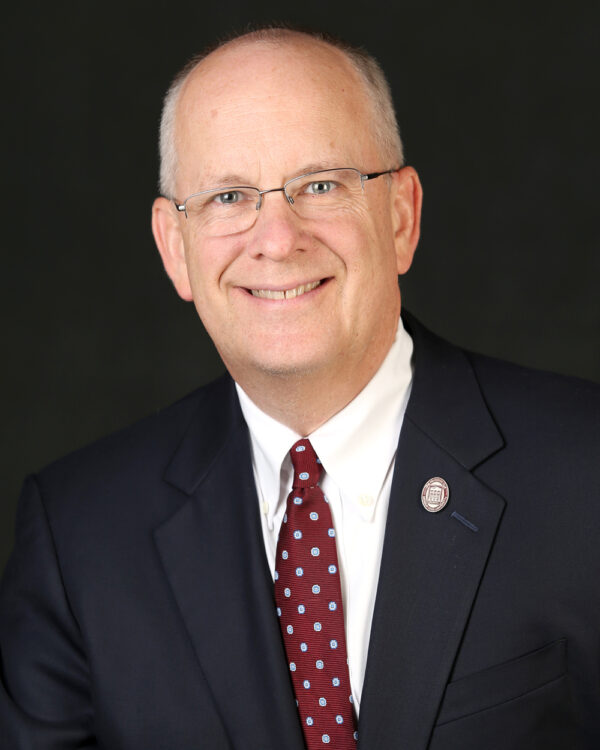
Clif Smart
President, Missouri State University
Managing people, data and personalities became an integral part of Clif Smart’s work during the COVID-19 pandemic. As president of Missouri State University, Smart worked to lead the organization through waves of the pandemic by emphasizing the importance of transparency and data-driven decisions — while recognizing other key elements that factor into the success of the university and its students, faculty and staff.
On looking at the bigger picture
“You’ve got to remain flexible and you’ve got to preserve your options until you have to make a choice because it has been very unpredictable. I think the other thing: For many of us, it’s more than just protecting your health. We, in our country, need business to continue, we want entertainment to continue, we need to have meaningful engagement with people to have a life worth living, we need to continue to be able to go to concerts and churches and gather with friends and family. Absent something like the bubonic plague coming through, I think you can’t just make decisions based on a pandemic. I think you have to have a bigger framework.
On the importance of creating trust
“You have to communicate 10 times more than you think you do, and 20 times more than you do regularly. That’s reassuring to people. And the other piece is if you’re not telling them, and if you’re not soliciting input, and you’re not giving them a framework, then they’ll create one on their own.”
On waiting to make the right decision
“Don’t make decisions until you know for certain, which is not typically Leadership 101. This last year, for example: In October, we took the mask requirement off except in classrooms and clinics and a few other places. We were thinking that at the end of the semester, it would go off completely. But we said there’s no point in making that decision until we’re four days before school. Well, by then we’d had an omicron surge, and so thank goodness we hadn’t made that decision. We wanted people, to the extent that they can in the world in which we now live, to be able to rely upon things that we said.
“I think the combination of not having to reverse decisions, and widely soliciting input — in a lot of those town halls, we did surveys, ‘Take out your phone, and answer this question,’ — and getting input, sharing information as broadly as we can, meeting with any group that we wanted to meet with, the combination of communicating times 10, plus not having to remake decisions, helped people gain confidence in us. And so, when we said, ‘We think it’s time to end the mask requirement,’ I didn’t get a single employee email telling me that I was a Nazi. I think we had developed people having confidence that we’re going to make right decisions at the right time based on data.”
On the importance of coordination
“Try to not be on an island by yourself. When we rolled our mask requirements off, we coordinated so that Drury and OTC did it on the very same day, and we announced it at the very same time. Because again, then people know, ‘OK, they’ve coordinated this; they’re thinking about this.’ And we were able to say, ‘The Springfield-Greene County Health Department has told us this would be appropriate now.’ You’re letting people know that we’re not just shooting in the dark — we didn’t just get tired of this, but that we’ve been working on this.”
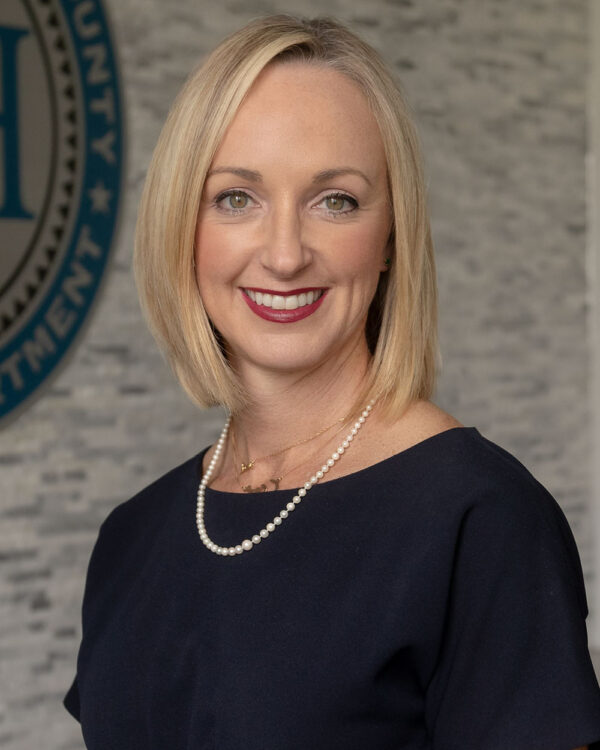
Katie Towns
Director of Health, Springfield-Greene County Health Department
The COVID-19 pandemic has shone a bright light on the role of public health in a community’s well-being. Katie Towns saw this firsthand, both in her role as assistant director for the Springfield-Greene County Health Department, and after she officially took over for former Director of Health Clay Goddard in 2021. Looking both back and forward at the pandemic, Towns notes shifts that have impacted her department’s role and work.
On the arrival of the vaccine
“The arrival of the vaccine was one of those major pivotal moments that continued as the production ramped up and we saw more and more arrive in our community. And then, as we started to see the evidence, when the younger and younger age categories were offered vaccine. Each of those moments has been significant in terms of offering protection to people so that we could really change the trajectory of how COVID was affecting our community.”
On the impact of variants
“Delta was an extremely trying time, where there were lots of people becoming very sick without the resources that we had necessarily been given the luxury of planning for. The omicron surge was obviously significant as well, but it has shifted the paradigm in terms of us really moving into a phase where we know that probably any of the other variants that come along are going to be much more transmissible like this one has been, and therefore more and more people will contract the illness, and without vaccine providing that protection, people are left very vulnerable.”
On new skepticism of traditional public health measures
“That there have been continued attacks on public health as a concept is what’s sort of surprising to me more so than anything. Having legislation filed to adjust or peel back some of the vaccination schedules that have been used for decades to protect children in schools and protect our communities from things like measles, mumps and tuberculosis. The idea of having to isolate somebody who’s very sick with a disease that can transmit extremely easily. All of these practices are being called into question and, in some places, attacked with legislation being filed, or people being attacked as leaders.
“Those are all things that are surprising to me as we continue to navigate this world that we are going to exist in with COVID. Where does that sort of leave us as we enter the next phase of our future with communicable disease?”
On tragedy and hope brought by COVID-19
“There’s been a lot of tragedy that has come from the fact that public health has been under scrutiny and sort of devalued. People have died. A lot of people have died, because we have not been able to overcome the politicization of this issue. And so I do see that as tragedy. But I also have high hope in humanity. And I think that there are lots of lived experiences that are happening and have happened over the course of the couple of years that we’ve all endured, that have opened people’s eyes to the possibilities of changing their minds about opinions that they’ve held on to.”
By Kaitlyn McConnell with support from Louise Knauer.
‘Reflections on Leadership’ Community Timeline Return to Main Page
